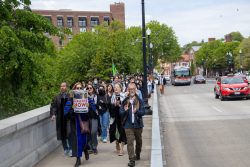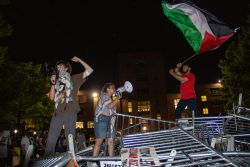Panelists discussed Georgetown’s speech and both the benefits and dangers of free speech on campus at Tuesday night’s Speech and Free Expression Forum.
The panel, composed of Professor of Law J. Peter Byrne, University President John J. DeGioia, University Professor of Linguistics Deborah Tannen, Rev. James P. M. Walsh S.J. and student Andrew Koneschusky (MSB ‘03), addressed an audience of 70 students, faculty members and administrators in McNeir Auditorium.
Byrne noted that as members of a private university, Georgetown students are not subject to the same First Amendment protection as those attending state schools. He insisted that, despite this fact, Georgetown emphasizes debate as the “center of its identity and its mission.”
DeGioia discussed the University’s emphasis on intellectual discussion. He recognized the University as a “catalyst and container of conflict,” an environment in which intellectual independence can be fostered.
Tannen acknowledged the necessity of free speech, but noted the dangers that must be addressed in order to facilitate productive dialogue. More than two sides exist to every argument, and presenting only two would result in “polarized views defining the debate,” Tannen argued.
Declaring that “there is no other side to historical fact” and fearing the impressionability of audiences, Tannen expressed her disgust with recent Georgetown speaker Norman Finkelstein, whose speech on the Holocaust caused a controversy on campus.
Stressing that the policy is “predicated on a fundamental trust,” DeGioia stated that invited speakers’ ideas are not necessarily endorsed by theUniversity.
DeGioia described the complex balance of supporting Catholic ideals and respecting the individual.”
“Just because the Church’s stance is clear and unequivocal … doesn’t mean you can’t talk about it,”DeGioia said.




